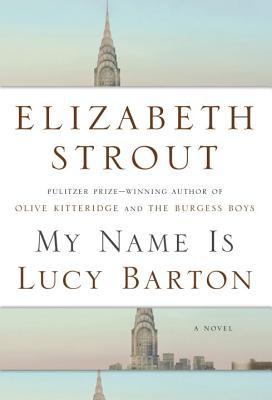 My Name Is Lucy Barton by Elizabeth Strout
My Name Is Lucy Barton by Elizabeth Strout Formats available: hardcover, paperback, ebook
Pages: 193
Published by Random House on January 12th 2016
Purchasing Info: Author's Website, Publisher's Website, Amazon, Barnes & Noble, Kobo, Bookshop.org
Goodreads
A new book by Pulitzer Prize winner Elizabeth Strout is cause for celebration. Her bestselling novels, including Olive Kitteridge and The Burgess Boys, have illuminated our most tender relationships. Now, in My Name Is Lucy Barton, this extraordinary writer shows how a simple hospital visit becomes a portal to the most tender relationship of all—the one between mother and daughter. Lucy Barton is recovering slowly from what should have been a simple operation. Her mother, to whom she hasn’t spoken for many years, comes to see her. Gentle gossip about people from Lucy’s childhood in Amgash, Illinois, seems to reconnect them, but just below the surface lie the tension and longing that have informed every aspect of Lucy’s life: her escape from her troubled family, her desire to become a writer, her marriage, her love for her two daughters. Knitting this powerful narrative together is the brilliant storytelling voice of Lucy herself: keenly observant, deeply human, and truly unforgettable.
My Review:
My Name is Lucy Barton is literary fiction. Which means that not much happens. So fair warning, this is going to be one of those reviews where I end up talking a lot about how the book made me feel, rather than what the book was about.
Because I’m not quite sure what this book was about, at least in the sense of what the plot might have been. Or even if there is one.
Instead, this is a novel about relationships. And it is also very much a story about secrets, especially the ones where the need for secrecy becomes so ingrained, that we no longer even tell them to ourselves.
The ostensible story is about Lucy’s unexpected extended hospital stay, but it is clearly told from a point much later in her life. And as her thoughts roam over the whole of her life, she hints at memories from her childhood and adolescence.
It’s clear that there was a lot wrong in the Barton household while Lucy was growing up. The family was poverty-stricken, but that wasn’t either the real or the whole of the problem. Sparked by an extremely unexpected visit from the mother she hasn’t seen for years, in the quiet of her own mind Lucy hints at the things that went wrong. But she never speaks of them, not even to herself, at least not in detail.
There’s a monster lurking somewhere in that dim past, but the habit of never revealing that truth, whatever it was, is so ingrained that Lucy doesn’t even let herself think it. Consequently, the reader never does know precisely what happened.
What we do know is that those long ago troubles shaped Lucy’s life, and that her mother’s inability to even touch on those difficulties is part of their estrangement. At the same time, Lucy longs for real connection with her mother. And even though she is terribly grateful that her mother is there for those long, uncertain days in the hospital, Lucy still doesn’t get what she needs.
Escape Rating B-: I finished this, I found it interesting enough to keep turning back to over and over throughout the day, but in the end, it didn’t move me. There was no catharsis, no true ending.
Throughout the story, Lucy hints at terrible secrets, but she never reveals them, even to herself. As a reader, I felt let down at the end. I expected a resolution, or at least a reveal, that never came.
At the same time, part of what kept me coming back was the tenuous relationship between Lucy and her mother, which had some uncomfortable parallels to my own relationship with my mother. And maybe that was the point of the whole story. Not that Lucy tells us what happened to her, but that it makes the reader reach for the resonances in their own story. It’s not what the story gives us, but what we bring to it.
And that’s an uncomfortable thought.



















I thought this book was amazing, and I prefer a book that makes me feel something more than just following what happens. Here’s my review http://drchazan.blogspot.co.il/2015/12/depths-in-simplicity.html